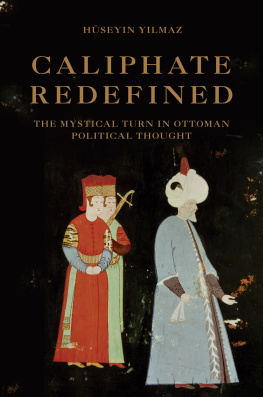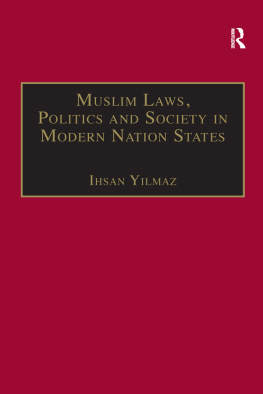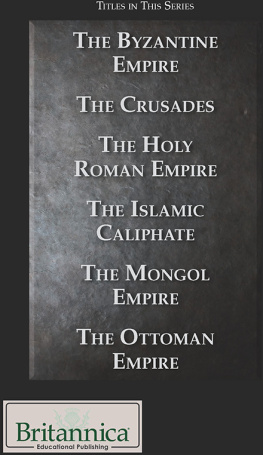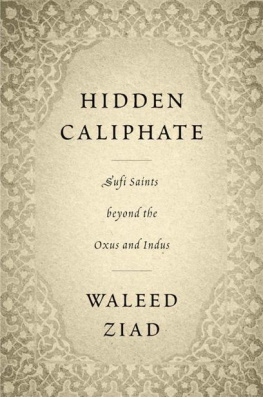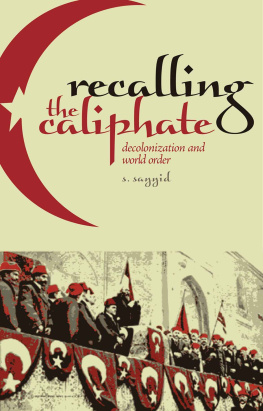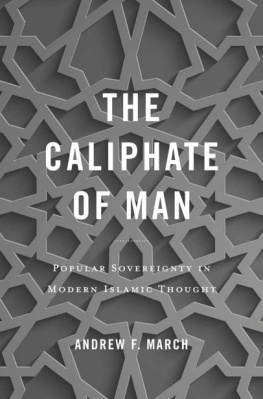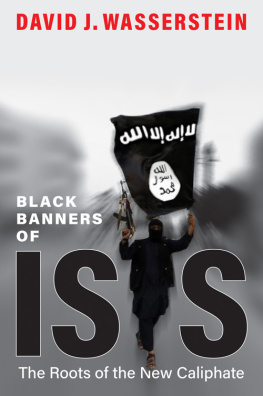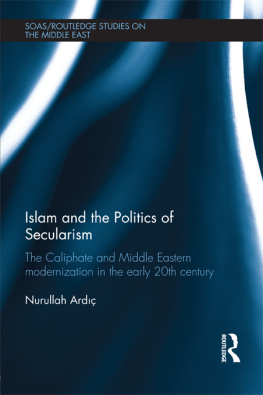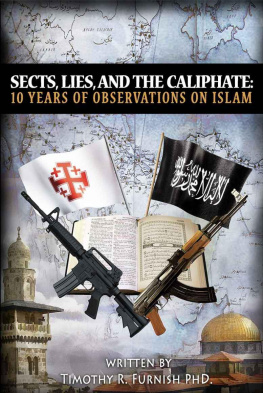CALIPHATE REDEFINED
Caliphate Redefined
THE MYSTICAL TURN IN
OTTOMAN POLITICAL THOUGHT

Hseyin Ylmaz
PRINCETON UNIVERSITY PRESS
PRINCETON & OXFORD
Copyright 2018 by Princeton University Press
Published by Princeton University Press,
41 William Street, Princeton, New Jersey 08540
In the United Kingdom: Princeton University Press,
6 Oxford Street, Woodstock, Oxfordshire OX20 1TR
press.princeton.edu
Jacket art: The Sultan Suleyman the Magnificent (14941566)
with two dignitaries; Reis Haydar, Nakkep, called Nigari (1494572).
Topkapi Palace Museum, Istanbul, Turkey, Bridgeman Images
All Rights Reserved
ISBN 978-0-691-17480-8
Library of Congress Control Number: 2017936620
British Library Cataloging-in-Publication Data is available
This book has been composed in Miller
Printed on acid-free paper.
Printed in the United States of America
10 9 8 7 6 5 4 3 2 1
To my father and mother,
Yusuf and Melek
CONTENTS
ACKNOWLEDGMENTS
THIS BOOK TOOK ITS FINAL SHAPE through indispensable contributions of scholars, friends, colleagues, institutions, and my family. My special thanks and gratitude are due to scholars who took part in this endeavor from early on in different capacities. Cemal Kafadar, besides his unremitting support and supervision throughout my graduate training and writing, has been a continuous source of inspiration at every level of my research and analysis. My conversations with Cornell Fleischer, as well as his encouragement and support, helped me overcome major challenges of this project while his comments saved this work from many probable pitfalls. My discussions with Roy Mottahedeh on various aspects of political thought throughout the process provided me with exciting questions to explore. During the early stages of my work, the late inasi Tekin exerted as much effort as I did in grappling with the idiosyncrasies and complexities of Turkish manuscript texts that helped me to proceed with confidence. Each time I visited Hossein Modarressi to seek help in my quest to make sense of what seemed to be the most ambiguous passages from Arabic and Persian manuscripts, he startled me with his instant grasp of what I had previously despaired of comprehending. Ridwan al-Sayyid helped me acquire a deeper understanding of the major issues and problems of pre-Ottoman Islamic political thought and kept me up-to-date with new publications in Arabic on the subject. The late Halil Inalcik, who pulled me back to Ottoman history from a possible career in political science and directed my attention to some little known but exciting texts on political thought, was a true mentor all along.
I am grateful to a number of institutions and their staff that provided indispensable assistance of various kinds during the research and writing stages of this monograph. Among them, the Center for Middle Eastern Studies at Harvard partly funded my summer researches for several years. The American Research Institute in Turkey provided a generous grant for one of my research trips to Turkey. The Foundation for Arts and Sciences in Istanbul offered me the use of their facilities and access to their resources needed for my research. The Center for Islamic Studies in Istanbul granted me access to its library resources, which saved me much time and labor during the early stages of my research. Nevzat Kaya at the Sleymaniye Library and Filiz aman at the Topkap Saray Museum Library turned my research at the library into one of my most memorable experiences. Charles Fineman and the acquisitions department of Widener Library helped me acquire many hard-to-obtain manuscripts from collections abroad. I am truly grateful to Muhittin Macit and Ferruh zpilavc of the Turkish Manuscript Association for their professionalism and collegiality; they consistently spared no effort in delivering my never-ending requests, always faster than I could hope. The completion of this monograph owes a great deal to the support and opportunities provided by the Introduction to the Humanities Program at Stanford University, University of South Florida, International University of Sarajevo, the Internationales Forschungszentrum Kulturwissenschaften in Vienna, George Mason University, and the Ali Vural Ak Center for Global Islamic Studies. Needless to say, this monograph required the use of manuscript sources in a long list of libraries throughout the world. Among them my special thanks go to colleagues, curators, and staff of Bibliothque Nationale de France in Paris; the British Library in London; Dar al-Kutub in Cairo; Gazi Husrev-Begova Biblioteka in Sarajevo; sterreichische Nationalbibliothek in Vienna; Staatsbibliothek zu Berlin; university libraries at Princeton, Harvard, Chicago, Yale, and UCLA; al-Zahiriyah Library in Damascus; and virtually all manuscript libraries in Turkey, most notably the ones in Istanbul, Konya, Bursa, Amasya, Manisa, Kayseri, Ankara, Ktahya, and Izmir.
My heartfelt thanks are due to a number of friends and colleagues who shared the burden with me throughout the research, writing, and the publication process. First and foremost, Himmet Takmr generously worked with me in solving a myriad paleological and philological problems posed by sources, shared his insights on Ottoman intellectual history, and commented on my analysis during our numerous lengthy discussions. Hayrettin Ycesoy never grew tired of sharing his unmatched expertise on the history of Islamic political thought and often accompanied me in my contemplative journeys into solving intricate problems of intellectual history. During the early stages of my research, hsan Fazlolu and Harun Anay offered me their expertise in navigating through manuscript collections in Turkey. Cengiz imans company and our never-ending book-talk made the writing of this monograph more pleasant than it otherwise may have been. Gnhan Breki, Seyfi Kenan, and Akn Kiren helped me obtain some source material that was beyond my reach. My ever more enlightening conversations through many years with Ali Vural Ak, Cemil Aydn, Sreyya Er, and Erol atalba must have spilled over the pages of this monograph, albeit without quotation. I am particularly indebted to the late Shahab Ahmed, who initiated my conversation with Princeton University Press, for his continuous stream of encouragement and insightful comments without which this monograph would have been less than what it has become in many respects.
I thank a number of colleagues and editors for their guidance and feedback in preparing the manuscript for publication. When demanded by the exigencies of academic life, Bassam Haddad and Ahmet Selim Tekeliolu were always ready to help me spare more time for writing. Mack Holt offered his experience and insights in shaping up the manuscript for publication. Mark Farha read and commented on my entire draft in early stages of writing. K. E. Duffin, Eileen P. Duggan, Mary E. Benson, and Brittany Dawson edited and commented on parts of the manuscript. Sami Erdem proofread the entire text for foreign vocabulary and references. My copyeditor Theresa Kornak diligently worked on the text to improve its style and language. I offer my special thanks to Fred Appel, my editor at Princeton University Press, not only for his unremitting support throughout the publication process but also for his invaluable suggestions in revising the manuscript.
Above all, no words can express my indebtedness and gratitude toward my family, whose role in the completion of this monograph has been much greater than mine. My father Yusuf and mother Melek have always supported me, often beyond their means. My wife Selma has shared with me both the joy and the hardship of research and writing throughout. My brothers Mustafa, Recep, Fahri and Hasan and sister erife have done more than I could ask to ease my work and my distance from home. Finally, my precious times with my son, Ahmet, were my most awaited moments of joy and relief during the entire process.
Next page
